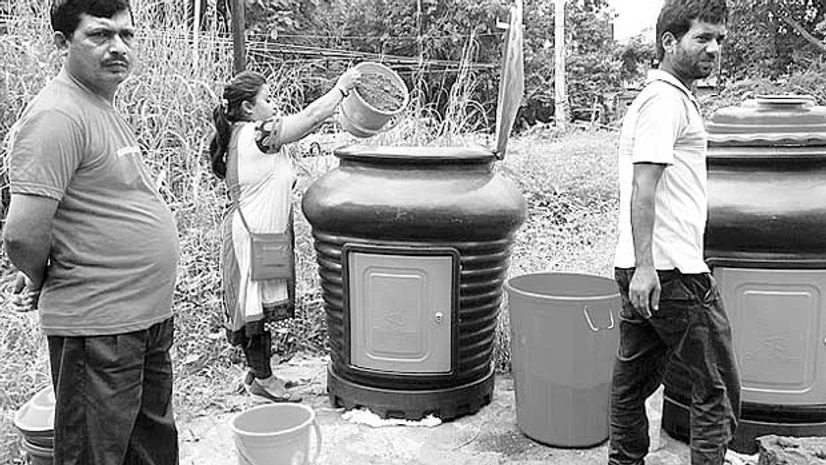Consider these facts. New Delhi has four landfill sites. Of these, three are operating beyond their capacity, measuring over 40 metres in height, when the permissible limit for dumping garbage at a landfill is between 15-20 metres. These festering dumps of unsegregated waste not only leach toxins underground, they also release vast amounts of methane into the atmosphere. Soon, these too will be exhausted. Like Delhi, most Indian metros are soon going to run out of places to hide their waste.
Experts have known for years that this is going to happen. NGOs have been working with communities to reuse and repurpose objects headed for the dump. Activists have conducted walks to landfills to sensitise people about what happens to their garbage, in the hope that they would recycle more and discard less. But many believe that a tiny Bengaluru-based social enterprise has been among the first to highlight the fact that the solution to India's overflowing landfills actually begins at home. When Daily Dump launched their home composters in 2006, they introduced people to the idea that by segregating their waste into wet (which is compostable) and recyclable (like glass, plastic and paper), they could significantly reduce the amount that they were sending to the landfill every day. Moreover, they would convert waste into a usable resource - compost.
Daily Dump's philosophy trashes urban planning in India that has created centralised spaces in the city's outskirts for the dumping of mixed urban waste. However, as Poonam Bir Kasturi, the impassioned founder of Daily Dump points out, "This has resulted in dirty streets, poisoned land, water and air pollution. It was the sight of our overflowing dumps of toxic mixed waste that led me to work on a decentralised model of waste management."
More From This Section
Making inroads was hard initially, given the social stigma attached to the handling of waste in India. "Changing people's attitudes towards waste management hasn't been easy," she says. To enable an attitudinal change, Bir Kasturi has conducted scores of workshops across Bengaluru, even running a "Trash Trail" in which people could trace where the garbage they dumped in a bin, actually landed up. Soon, sales began to pick up, even though Daily Dump never explicitly marketed its composters, instead convincing people to segregate and compost their waste. The figures speak for themselves: Daily Dump calculates that its products have kept 27,435 kgs of organic waste out of landfills daily. Its customer base has grown to 31,164, and its sales have doubled year after year. Their latest offering, the Aaga, a large composter for community use, has also done well, with 427 units being installed in two years. Further, to ensure that home composting becomes a reality across India and indeed, the world, Bir Kasturi has put her Daily Dump composter designs under the Creative Commons license, making them free to download and use by anyone who's interested. So far, her designs have been cloned a dozen times in India and abroad. The social enterprise has received a string of awards and recognitions, and was a finalist in the 2015 Jubliant Schwab SEOY Awards. The Daily Dump's low-tech waste management products have also featured in the 2011 report, India Innovates, by Confederation of Indian Industry.
Interestingly, Bir Kasturi has found that many first-time home composters become evangelistic supporters. Daily Dump now has a network of over 60 partners across the country, who are engaged in not only selling its products, but also spreading awareness about why it is important to segregate and compost one's own waste. Monica Khanna Gulati, a Delhi-based user of the Daily Dump home composter, the Khamba, says that once she began composting her kitchen waste five years ago, there's been no looking back. To all those who wonder how their individual effort can ever make a difference, Bir Kasturi, who's known in Bengaluru as the Compostwali, has shown that it is such individual efforts that can solve the problem of India's festering waste management problem.
Visit www.dailydump.org or their Facebook page

)
